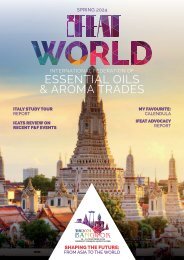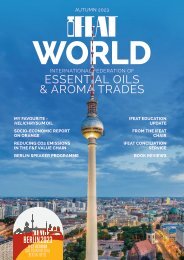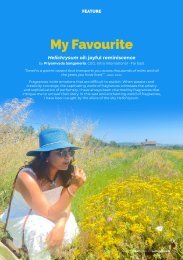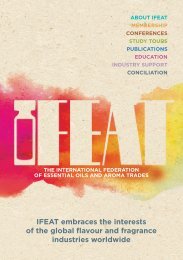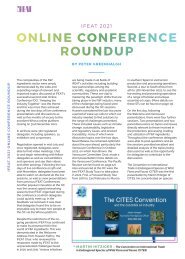You also want an ePaper? Increase the reach of your titles
YUMPU automatically turns print PDFs into web optimized ePapers that Google loves.
8<br />
WORLD<br />
WORLD 9<br />
MY FAVOURITE • TURKISH COFFEE ABSOLUTE • BY ASLAN GÜLÇIÇEK<br />
Coffee is part of the botanical family<br />
Rubiaceae, one of the largest families in<br />
the plant kingdom. The Rubiaceae family<br />
comprises almost 500 genera and more<br />
than 6,500 species. The coffee plant,<br />
which was discovered in Ethiopia in the<br />
11th Century, has a white blossom that<br />
smells like jasmine and a red, cherry-like<br />
fruit.<br />
The story of this aromatic brew begins<br />
in Ethiopia. Fossilised remains have<br />
been discovered next to ancient human<br />
remains in the south west of Ethiopia,<br />
the same area in which the coffee beans<br />
were first harvested from wild coffee<br />
plants. The story goes that Kaldi (or<br />
MY FAVOURITE<br />
TURKISH<br />
COFFEE ABSOLUTE<br />
BY ASLAN GÜLÇIÇEK<br />
Khalid who was a legendary Ethiopian<br />
Sufi goatherd) noticed the increased<br />
energy of his goats after they ate coffee<br />
cherries, so he ground the berries in a<br />
mortar, mixed them with animal fat, and<br />
rolled the paste into a ball for convenient<br />
portability.<br />
Some versions of the myth continue to<br />
say that Kaldi brought the coffee cherries<br />
to an Islamic monastery but the monks,<br />
disapproving of the effect, threw them on<br />
the fire. When they noticed the delicious<br />
aroma caused by this, they doused the<br />
fire, gathered the roasted coffee beans<br />
out of the ashes, ground them down and<br />
then diluted them with water, creating<br />
the world’s first cup of coffee. Coffee<br />
was given its name, not by the place of<br />
its origin (Kaffa in Ethiopia), but from<br />
the Arabic word qahwa. This reflects<br />
coffee’s spread to Yemen, where the first<br />
coffee drink was consumed by ancient<br />
practitioners of Sufism, a mystical sect<br />
of Islam. It is this Yemeni coffee that we<br />
use in Turkish coffee today.<br />
The journey continues from Yemen to<br />
Istanbul, where in 1555 two Syrian<br />
traders brought the first coffee beans<br />
to sell at busy, bustling markets. Coffee<br />
found enormous popularity with<br />
Turkish sultans in the Ottoman courts.<br />
Turkish men would also be given a<br />
cup of coffee by prospective brides, a<br />
tradition still going on today. Coffee<br />
was integral to the social and courting<br />
rituals of the day in Turkey.<br />
Many of us drink it every day,<br />
often more than once, with<br />
or without sugar, sometimes<br />
accompanied by a little sweet.<br />
We drink it when we are<br />
happy, sad, hungry, after a<br />
meal, when we meet a friend,<br />
to share a laugh or to get to know each<br />
other.<br />
Although coffee typically spread through<br />
trade and travel, coffee historians tell<br />
us that the first coffeehouse to open in<br />
Vienna was by an accident of war.<br />
In 1683, when the Turkish<br />
army fought the Austrian<br />
army, the Turks accidentally left<br />
sacks of coffee beans during<br />
a retreat from the gates of<br />
Vienna. The Austrians quickly<br />
realised the treasure they had<br />
been given and developed<br />
their own style of coffee.<br />
My dear late friend and business partner<br />
Mr. Erol Mesulam first came up with the<br />
idea of producing the essential oil of<br />
Turkish coffee around 2011. Together<br />
with our R&D team, we have searched<br />
various literature and after lots of trials<br />
with different extraction techniques,<br />
we have found our current method of<br />
obtaining Turkish Coffee Absolute which<br />
is olfactively equivalent and as delicious<br />
as a cup of Turkish coffee.<br />
We have made three different variants<br />
by using the same technique, using less,<br />
medium and well roasted Turkish coffee<br />
beans. All three variants contain high<br />
concentrations of different pyrazines<br />
and furfural derivatives. Turkish Coffee<br />
Absolute works especially very well<br />
with fragrances containing oriental<br />
and chypre notes. It also provides an<br />
all-round gourmand character to the<br />
formulations added. We introduced it to<br />
our colleagues at the World Perfumery<br />
Congress in 2018.<br />
It is my favourite essential oil to date,<br />
not only because I enjoy the strong and<br />
distinctive smell of my Turkish coffee every<br />
day, but also because of the personal<br />
touch and efforts we have put in with Erol<br />
for many years to get the best quality of<br />
the Turkish Coffee Absolute we produce<br />
and offer today.<br />
Kaldi (or Khalid who was<br />
a legendary Ethiopian Sufi<br />
goatherd) noticed the increased<br />
energy of his goats after they ate<br />
coffee cherries<br />
It is my favourite essential oil to<br />
date, not only because I enjoy<br />
the strong and distinctive smell<br />
of my Turkish coffee every day,<br />
but also because of the personal<br />
touch and efforts we have<br />
put in with Erol<br />
MY FAVOURITE • TURKISH COFFEE ABSOLUTE • BY ASLAN GÜLÇIÇEK




